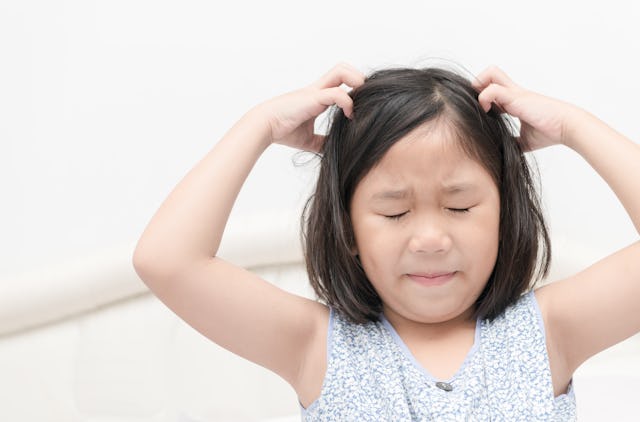How To Tell If Your Kid’s Flaky Scalp Is Dandruff Or Psoriasis, According To Dermatologists
Plus, tips for getting it under control either way.

Keeping on top of your kids' health means knowing what's going on with them from the top of their heads to their toes. But sometimes, you might spot something that leaves you low-key dumbfounded, especially if you're noticing your little one suddenly has a super itchy, super flaky scalp, and you're not quite sure what the deal is.
Not sure whether you're dealing with run-of-the-mill dandruff or if it's something more, like psoriasis? Two dermatologists gave Scary Mommy the scoop so you can spot the difference and know exactly when it's time to check in with a pro or if it's just a matter of switching up your kid's shampoo.
What is dandruff, exactly?
"Dandruff is a mild form of the common condition seborrheic dermatitis," explains Dr. Geeta Yadav, board-certified dermatologist and founder of FACET Dermatology. "Seborrheic dermatitis can present as a dry, itchy, and flaky scalp — or even an oily and flaky scalp. Mild cases of dandruff result in the shedding of tiny, white flakes. In more moderate cases, the flakes can get quite large, tend to look greasy, can be white or yellow in appearance, and can cause scalp tenderness."
And while it might feel alarming to spot signs of dandruff on your little one, it's "extremely common," especially in infants, when it typically presents as cradle cap, adds Dr. Purvisha Patel, board-certified dermatologist and founder of Visha Skincare. According to Patel, our scalps contain a yeast-like organism (called P. ovale) that thrives in damp, warm environments, such as those with oily hair. So, when someone has dandruff, their body is producing an immune response to the organism, which causes flaking and some mild itching. "Dandruff is your body's response to an overgrowth of this yeast," she explains. In babies, "It can get severe enough to have thick plaques of scale on the scalp (aka cradle cap)," but it can impact people of all ages.
What is psoriasis?
Psoriasis is an immune-related disease in which the body's T cells "attack the skin and create inflammation in the body," says Patel. "It typically manifests as scaly and inflamed patches, known as plaques, that can appear across the entire body as well as the scalp," adds Yadav. "When it appears on the scalp, psoriatic scales are often thicker and drier than those of dandruff and can appear silvery."
This genetic condition can cause flare-ups all over the body during times of illness (such as from viruses, like strep throat) or stress, says Patel. And even though it sounds serious, it's still relatively common, notes Yadav. "Psoriasis is less common than dandruff, but still not uncommon — more than 2 percent of Americans have psoriasis, with one-third of Americans experiencing symptoms as children."
How do you know what you're working with?
While anyone can develop dandruff, Patel notes that a child with psoriasis typically has a family member with the condition, too. And it is possible to deal with both conditions at the same time, says Yadav. "This is known as sebopsoriasis. You can tell if your child has this condition if the flakes look white and silver and if the rash responds to both anti-dandruff as well as anti-psoriatic treatments."
As with any skin condition you spot on your kiddo, "I highly recommend visiting a board-certified dermatologist, who can best determine which condition your child has," suggests Yadav. "After diagnosis, they can make accurate treatment recommendations tailored to their specific needs."
What are the treatment options?
"There's a lot of overlap when treating dandruff and scalp psoriasis," says Yadav. "The most common treatment that can be used to address both is washing with a shampoo that features coal tar or salicylic acid as an active ingredient, which can help manage flaking. Scalp psoriasis can really only be managed as it's a chronic condition, but dandruff can often clear up after a few washes. A board-certified dermatologist can prescribe targeted therapies for psoriasis, so seeking them out for an opinion on management (and especially diagnosis!) is helpful."
And even though you or your child might understandably be concerned, know there's no shame or judgment in either condition. "Keeping the scalp clean and balanced can help, but neither condition can truly be prevented, especially psoriasis as it is an immune-mediated inflammatory disease," says Yadav.
You can keep dandruff at bay by not sleeping in wet hair or hanging out in sweaty hair, says Patel. You'll also want to avoid "feeding" the dandruff-causing organisms by avoiding using edible oils in hair, such as coconut and/or olive oil. Antifungal and steroid treatments can help with dandruff if shampoo doesn't quite cut it, she says.
If localized to the scalp, "Psoriasis is treated topically with anti-inflammatory medications such as steroids," notes Patel. "In large areas, there are medicines that can be taken orally or injected to calm the immune system down." Your doctor might recommend an anti-inflammatory diet as well.
In general, Patel recommends a few lifestyle changes to help promote scalp health as well as full-body skin health: drinking lots of water, prioritizing sleep, and a daily multivitamin and a probiotic — your doctor can guide you to the best option for your kid's needs. Another pro tip per Patel: Stock your shower with hair and skin products free of fragrance, sulfates, and harsh chemicals, which can help with dry scalp or sensitive scalp.
This article was originally published on